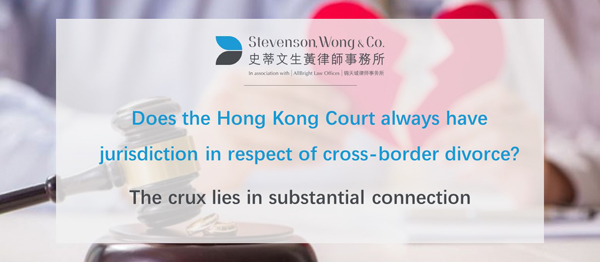The Hong Kong Court dismissed the Petitioner Wife’s Petition in a divorce case for want of jurisdiction, ruling that the Petitioner Wife had lacked substantial connection with Hong Kong.

Traditionally, the Hong Kong Court is one of the more popular jurisdictions to initiate divorce proceedings for couples with overseas connections, especially the expatriate community, due to the city’s international exposure. In recent years, as the Mainland and Hong Kong integrate social-economically, cross-border marriages between the Mainland and Hong Kong have increased prevalently. Currently, Mainland-Hong Kong cross-border marriages account for almost one-third of the 50,000 marriages registered every year in Hong Kong, while around 20,000 couples petition for divorce yearly.
A vital consideration in international or cross-border marriages is the choice of jurisdiction. In this respect, the Hong Kong Court has a set of clear guidelines in respect of its divorce jurisdiction. Not everyone can petition for a divorce in Hong Kong. By illustrating a recent Mainland-Hong Kong cross-border divorce case handled by our Private Client Department, this article sheds light on the Hong Kong Court’s approach to the issues of jurisdiction and forum in cross-border divorce cases.
Case Background
This is a divorce case in relation to Mr Y and Ms C, who is a Hong Kong Permanent Resident. In August 2017, Ms C petitioned for divorce in the Hong Kong Family Court on the ground that she had substantial connection with Hong Kong at the date of her petition. Therefore, as per Ms C, the Hong Kong Court had jurisdiction over her divorce proceedings.
Our client Mr Y applied to the Court to dismiss Ms C’s Petition for the reasons as follows:- (a) the Court does not have jurisdiction over the case; or (b) the proceedings should be stayed on the ground of forum non conveniens and be heard in the Beijing People’s Court.
In order to establish her substantial connection with Hong Kong, Ms C relied on a number of matters, namely, (1) Ms C is a holder of Hong Kong Permanent Identity Card, Hong Kong Special Administrative Region passport and has obtained permanent residency; (2) Ms C was employed by a Hong Kong company and had come to Hong Kong regularly on business trip, establishing social network in Hong Kong; (3) the parties purchased a property in Hong Kong as their matrimonial home; and (4) Ms C maintains a bank account in Hong Kong.

Court’s Decision
Issue 1: Does the Hong Kong Court have jurisdiction – does Ms C have substantial connection with Hong Kong?
Section 3(c) of the Matrimonial Causes Ordinance (Cap. 179) sets out the Hong Kong Court’s position on divorce jurisdiction:- either party to the marriage is required to have substantial connection with Hong Kong at the date of petition.
How to determine the issue of substantial connection – the Court quoted the principles in ZC v NC (Divorce jurisdiction) [2014] 5 HKLRD 43 in this respect:-
- Whether a party has substantial connection with Hong Kong is a question of fact, and the Court needs to look at surrounding factors on a case-by-case basis;
- At a starting point, the Court has to determine whether the party has connection with Hong Kong, thereafter to determine whether the connection is a substantial one;
- For the connection to be substantial, the party’s presence in Hong Kong cannot be transitory in nature, otherwise this will encourage “fly in” and “fly out” divorces;
- Resident status in Hong Kong is only one factor to be taken into account as the party may not be living in Hong Kong on a long term basis. Other factors include the party’s past pattern of life, the frequency of visit to Hong Kong, the length and purpose of stay and whether the party is engaged in business or work in Hong Kong, whether the rest of the family is in Hong Kong, whether a home has been established, whether the children are at school in Hong Kong, etc.
- The fact that a party is shown to have substantial connection elsewhere may be used to contrast with the connecting facts he has in Hong Kong to determine if the Hong Kong connection is substantial.
Applying the legal principles above, the Court ruled on the matters relied by Ms C to establish substantial connection as such:-
- Hong Kong permanent residency is insufficient to constitute substantial connection – Despite recognising that Ms C is a holder of Hong Kong Permanent Identity Card and Hong Kong Special Administrative Region passport, the Court was of the view that on or before the date of her Petition, Ms C only stayed in Hong Kong for a limited number of days. The Court held that Ms C did not treat Hong Kong as her home. Moreover, the fact that she has no Hukou or identity card in the Mainland was not indicative of her substantial connection with Hong Kong.
- Holding a property in Hong Kong is not equivalent to having a matrimonial home in Hong Kong – Ms C alleged that she holds a property in Hong Kong as the parties’ matrimonial home. It has been shown by records of the Immigration Department that the parties had only been in Hong Kong at the same time for 4 to 7 days in the period between 2008 and 2012. They had not been in Hong Kong together since 2013. Therefore, contrary to Ms C’s contention, the Court held that the property in question was not the parties’ matrimonial home.
- Maintaining a bank account in Hong Kong is only a matter for consideration of substantial connection – Ms C alleged that she had opened a bank account in Hong Kong in 2007 and is still using it as her primary bank account in Hong Kong. Nonetheless, in the era of globalisation and proximity between Hong Kong and the Mainland, it is commonplace to hold assets, bank accounts and companies in Hong Kong, particularly for individuals who travel across the border frequently.
- Being once employed and having social network established in Hong Kong does not necessarily amount to substantial connection – Ms C alleged that she had come to Hong Kong regularly on business trips since 1990. Thereafter she worked as an insurance broker in Hong Kong and had established social network here, being a member of a club in Hong Kong. The Court held that, to determine whether there was substantial connection, the relevant time to be considered was the date of petition. Given that Ms C had only been present in Hong Kong for a limited number of days for the past 9 years, the employment history of Ms C does not assist her case.

Issue 2: Even if the Hong Kong Court has the relevant jurisdiction, is the principle forum non conveniens applicable such that the case should be heard in the Beijing Court?
The Court also ruled in favour of Mr Y for his application to stay the proceedings in Hong Kong on the ground of forum non conveniens. Applying the guiding principles as set out in the Court of Final Appeal case SPH v SA [2014] 3 HKLRD 497, the Court came to the conclusion that:-
- The Beijing Court is another available forum – the Court adopted the Mainland legal opinion adduced by Mr Y and held that Mr Y was entitled to commence relevant proceedings in the Beijing Court.
- The Beijing Court is a more appropriate forum – Considering that the parties were married in the Mainland, they spent most of their marital life in the Mainland, they signed a pre-nuptial agreement in the Mainland and are currently subject to another company litigation in the Mainland. The Court was of the view that the Hong Kong Court was not the natural or appropriate forum of the current divorce proceedings.
- Ms C will not be deprived of her legitimate personal or juridical advantage if the case is tried in the Beijing Court.
Court’s Decision
Applying the legal principles to the facts of this case, the Court held that Ms C failed to prove that she had substantial connection with Hong Kong as at the date of Petition. Accordingly, the Court dismissed Ms C’s Petition for want of jurisdiction. Even if the Hong Kong Court had the relevant jurisdiction, the Court still considered the Beijing Court to be a more appropriate forum to hear the case.
Case Commentary
This is a very typical Mainland-Hong Kong cross-border divorce case, primarily on the Hong Kong Court’s approach to its divorce jurisdiction and incidental disputes. When a marriage has come to an end, the party who is minded to petition for a divorce in Hong Kong is advised to produce sufficient evidence, especially for establishing either party’s substantial connection with Hong Kong. This serves to invoke the divorce jurisdiction of Hong Kong Court and to establish that Hong Kong Court is the more appropriate forum to hear the case.
This article is co-authored by our experienced Private Client Team – our Partners Catherine Por and Wendy Lam, and our Senior Associates Karl Wong and Calvin Lo. Please contact our Catherine Por or Wendy Lam for any further enquiries or information.
This newsletter is for information purposes only. Its content does not constitute legal advice and should not be treated as such. Stevenson, Wong & Co. will not be liable to you in respect of any special, indirect or consequential loss or damage.
